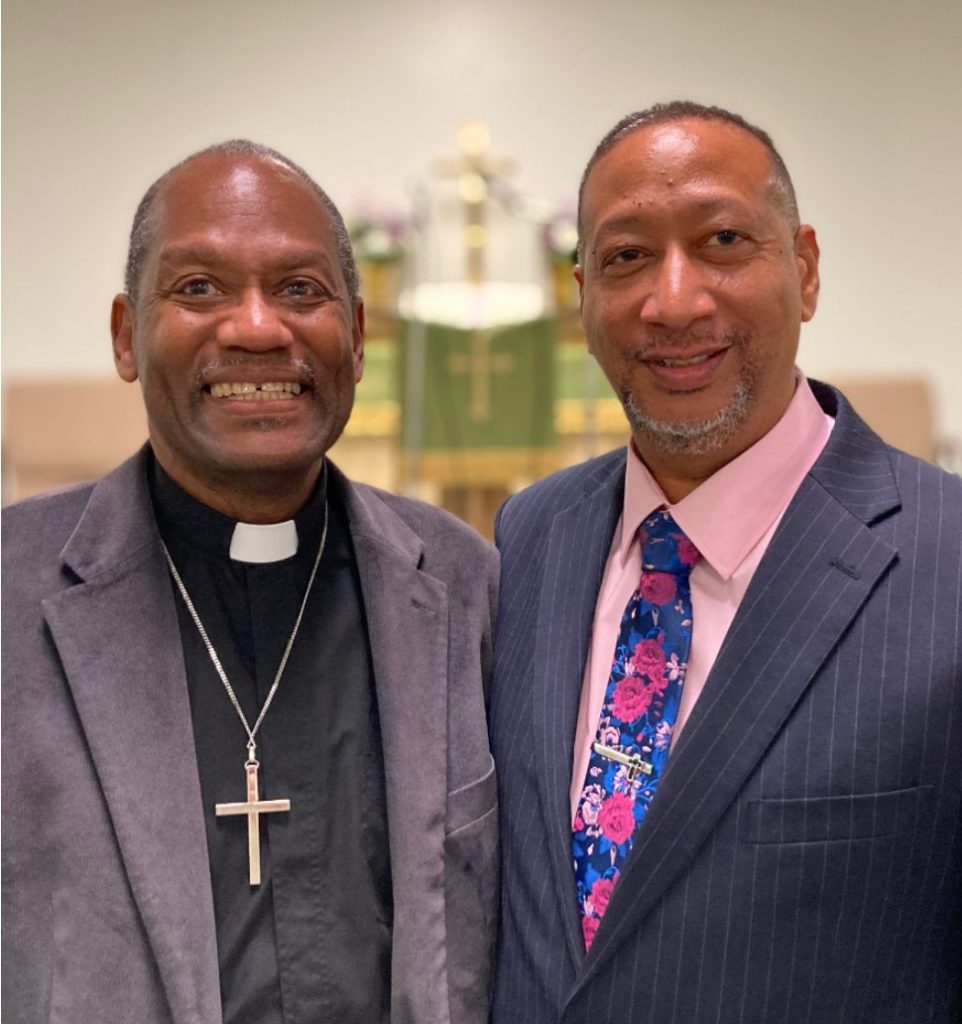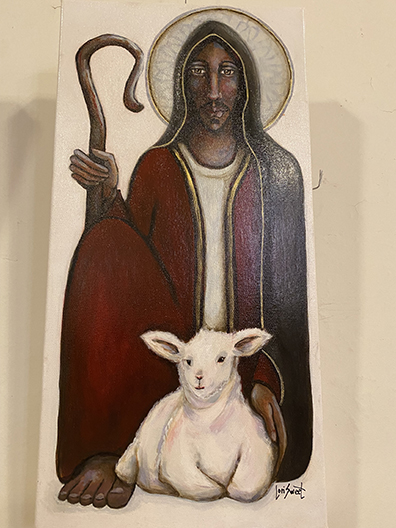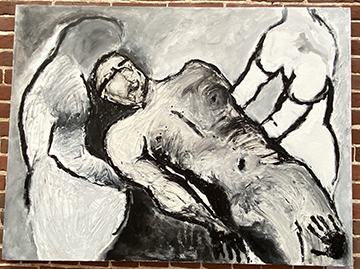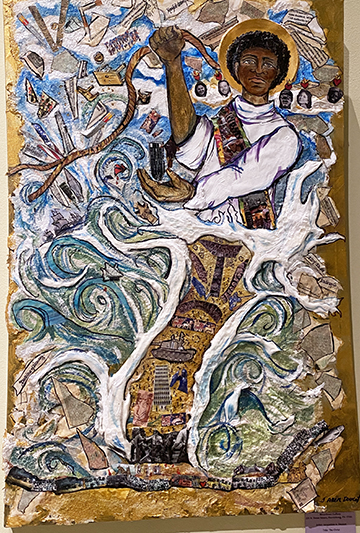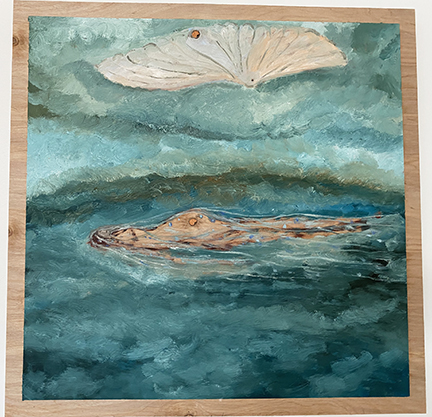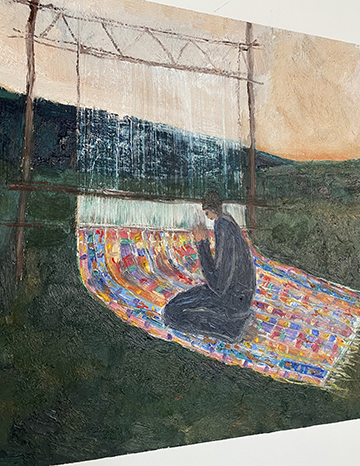
Mary Waters
For as long as Mary Waters could remember, she went to church.
She remembers going to Sunday morning services with her mom who lived in the neighborhood. The congregation at Camp Curtin Memorial Mitchell United Methodist Church was a church family in a literal sense—many of the members were related. Waters’ grandmother attended since she was a teenager, her mom grew up in the church, and then she, her siblings and cousins attended.
“I wanted to get married there,” Waters said. “I wanted to raise my daughter there. I wanted to be buried there.”
When news hit in 2018 that the Susquehanna United Methodist Conference had plans to close 10 of Harrisburg’s churches in the denomination, Waters was devastated.
She couldn’t believe the church that had been so important to her family for so long, and that held so much history, would close.
Most church members wanted to remain in the building, Waters said. They didn’t want to close or join with another church, which were given to them as options. But in the end, the conference made its decision, and Waters found herself, along with her family and friends, attending their last service in the church.
“It’s not about the building—it’s about your religion and who you are,” Waters said. “But look at me. I’m 35, and they had the building since I was a baby, and even before that when my parents were kids. It was definitely a pillar of the community.”
Since then, the church members dispersed. Some went to other churches. Many older members passed away, and Waters started going to her father’s church with her daughter. But it wasn’t home.
Like Camp Curtin, nine other United Methodist churches in Harrisburg were faced with the same challenge, but not all faced the same fate.
It’s been over two years since Harrisburg’s real estate market suddenly experienced an influx of churches for sale. They have even been purchased since then, with some developers planning to turn them into apartment buildings.
Back then, the closure of so many large, historic churches in the same city seemed out of the ordinary. And there was a reason for that. Indeed, it was very unusual.
The Vision
The Susquehanna United Methodist Conference—the local branch of a global Protestant denomination—oversees seven districts in the area: York, Altoona, State College, Lewisburg, Williamsport, Scranton/Wilkes-Barre and Harrisburg.
In late 2018, the conference targeted one of those districts for church closures and consolidation—Harrisburg.
Rev. Barry Robison, the district superintendent for the Harrisburg area, was part of the process, an initiative that, he said, hadn’t been done before, not just on a local level, but in the United States as a whole.
“We’ve found places where the idea was implemented but not on this scale,” Robison said. “This is the first time this vision was given for an entire city.”
And while he said that this decision could’ve been made for other cities in their jurisdiction, it wasn’t. They chose Harrisburg and, so far, only Harrisburg.
The vision, called “Impact Harrisburg,” was to join all 10 churches, some of which had been around since the 1800s, and form one congregation with satellite campuses meeting in nontraditional spaces throughout the city.
The conference found that, on a Sunday, its 10 churches were averaging only 360 people across all venues combined, a number that Robison said a larger church in the conference may see on its own.
“The vision was that we could make better use of the people in those churches by bringing them together,” Robison said. “Individually, our congregations were limited in what they could do.”
When made aware of the plan, off the bat, one church, Grace Penbrook UMC, decided to close. Another, Rockville UMC, joined with Linglestown Life UMC in Lower Paxton Township. The Twenty-Ninth Street UMC accepted the merger, becoming The Journey Church, the place where, the conference hoped, all the Methodist congregations would join together as one.
But the other seven churches weren’t on board. They all voted to stay open, but it didn’t mean much in the long run. The conference had the power to make whatever decision it wanted.
Some of the churches created vitality plans, proposals for how they would improve if they were allowed to remain open, as requested by the conference. But in the end, in the summer of 2019, only one church’s plan swayed the conference to keep it open—Grace UMC on State Street.
Surviving to Thriving
You’d hardly believe that Grace UMC used to be known as a “snobby” church, as Sue Kompare, a member of 20 years, described it.
Rev. Michael Minnix hardly stopped smiling during our interview, gleefully pointing out the stained-glass windows and punching the keys on the organ. Kompare wore a T-shirt with a bunny on it and gave me a thorough tour of the sprawling building, including the children’s classroom with the closet full of crafts.
“Now I think we have a very friendly congregation,” Minnix said.
These days, that seems to be the main goal of the church—make room for everyone. They’ve specifically set their recruitment efforts on the LGBTQ community, rebranding as an open and affirming congregation.
But just two years ago, Grace, despite its view of the state Capitol and a history of housing the state legislature when the Capitol burned down in 1897, was fighting to stay open.
For years, it faced the exact difficulties that the Methodist conference saw as reason for the consolidation. It was a huge, costly three-story building, with a dwindling number of congregants filling seats and a slipping grip on relevancy in the city.
But Grace used to be a thriving part of the community. When Kompare started attending the church about 20 years ago, after leaving Camp Curtin UMC, Grace was flourishing. She remembers an Easter service where the crowded pews forced people to stand in the back while a full choir belted out the “Hallelujah Chorus.”
But for the majority of Kompare’s time there, the church was generally unstable, and the number of members declined. Over the course of 20 years, the church had seven pastors. Kompare was convinced that its last pastor, before Minnix, was sent by the conference to shut the church down.
But still, the friends she made and the beautiful building kept Kompare around, and, in 2018, she found herself fighting to save it.
It took a lot of pushing back against the conference, but eventually Grace was allowed to remain open, and Minnix was pulled out of retirement to lead it. Robison said that their vitality plan, which focused on inclusion and new outreach programs, was what gave them a second chance.
“Grace’s plan was well thought out, and there were benchmarks to meet,” Robison said. “They did a wonderful job with that.”
Within a few months, Grace’s congregation grew from about 35 to over 80 people, and the church began housing a women’s homeless shelter and a support group for parents of transgender children. Kompare and Minnix are excited about the future of the church, which finally seems to be brighter.
Over the Cliff
Whereas Grace seemed to be on its last leg before the consolidation plan in 2018, Derry Street UMC had been growing, explained Mack Granderson, the former pastor of the church.
When he was sent to Derry Street in 2013, Granderson said that the conference expected the church to close in a few months. There were only about 25 members, who were mostly “gray hairs,” he said.
Around five years later, the church drew in a multicultural congregation of over 100 attendees on Sundays. They had also partnered with Crossroads Baptist Church and its pastor, Martin Romain, to expand their reach.
But their community ministries were really where they shined. They had programs for the neighbors they served in Allison Hill, including an after-school program, a food pantry, clothing closet and ESL classes, among other ministries.
“What God led us into was something truly remarkable,” he said.
That’s why Granderson was shocked when he heard the news from the conference.
Like the members of Grace, Granderson and leaders from Derry Street had many meetings with Bishop Jeremiah Park, head of the conference. Unlike Grace, their persistence didn’t pay off. In fact, Granderson was stripped of his license as a Methodist pastor. At the time, a spokesperson for the conference cited Granderson’s talk of leaving the denomination as a reason for dismissal. Romain had his suspicions.
“That I know of, [Granderson] was the only one that happened to be a person of color that they took such an aggressive stance against,” he said.
According to Robison, Derry Street was one of the strongest churches of the 10. He recognized the connections they made with the Allison Hill community. But the conference felt they could still be more effective if they brought their resources and connections to The Journey Church, he said.
But Derry Street saw it another way.
“I think they were more interested in their survival than the survival of the churches,” said Romain. “They were the ones who benefitted from the selling of properties and receiving all the assets.”
This is something that Grace Church brought up, too.
“I wonder if they were looking at it as property rather than mission and ministry,” Minnix said.
Minnix has a unique view of the situation.
He used to be a district superintendent for the conference. During his time, he oversaw 99 churches, an immense load, he said. Plenty of churches across his district were struggling financially, and some were even across the street from each other. But still, he said that he never “pushed a church over the cliff.”
“There may be a reason why a couple of the churches just can’t make it, but to make the decision for all the churches in the blooming city?” he said. “I had immense trouble with that.”
It seemed that this wide-sweep approach was at the heart of the issue. Churches like Derry Street didn’t feel regarded for who they were and how closely tied they were to their corner of the city.
“Derry Street had so many outreach programs, but they [the conference] would not pay them any attention, even with all that they did,” Kompare said. “They had a Spanish-speaking service because they were out there where the Hispanic residents were living. Here we were, and nobody lives near us.”
New Chapter
After they emptied out, the seven closed churches went on the sales market.
Since then, several have been purchased by other religious organizations. Riverside UMC on N. 3rd St. was purchased by Kesher Israel to be a centralized synagogue for its members. Derry Street was purchased by the Anglican Church of the Pentecost. Others also were bought by churches.
Some will be adapted for nonreligious purposes. First United Methodist Church on Boas Street is slated to become an eight-unit apartment building, bought by developer Derek Dilks. Camp Curtin was recently purchased by developers Chris and Erica Bryce, who have discussed an apartment building transformation, as well.
There’s a future for these buildings, just not the one that many of the church members had wanted.
When I asked Robison if, looking back, he still thought the conference’s plan had been the right thing to do, he said “yes.” But, retrospectively, seeing that it caused severed ties and lost members, he believed that they didn’t go about it the right way.
“Ultimately, I still think it was the right decision,” he said. “Would we do it exactly the same way? No. I think we could’ve taken it a little more slowly. Had we taken more time, I think we could’ve gotten a little more buy-in.”
Robison also mentioned how the consolidation had a positive impact on some churches, like Grace, which is now growing and reaching the LGBTQ community, which the other churches hadn’t been reaching, he said.
Also, the Journey Church is attracting a diverse community of people that the denomination didn’t reach before, Robison said.
Members of Derry Street have moved forward too, but not without the lingering pain that many of those impacted by the consolidation still feel.
“What started as a tragedy became a triumph,” Granderson said.
After being booted as a Methodist pastor, Granderson was ordained as a Baptist pastor. Throughout the pandemic, Granderson and Romain’s church, Crossroads Christian Ministry, joined up with the Rock Church on Market Street, worshipping virtually or in outdoor spaces. Their community is closer than ever, they explained. The pair of preachers is excited about their future as they seek to purchase their own church building soon.
Hearing about these hopeful futures, the question could be asked—was it worth it? I don’t think those involved would go as far as to say yes, especially those like Waters, who still don’t see a bright road ahead, as do members at Grace and Crossroads. Suffering isn’t a fond memory, even if it made you stronger.
But what happened in Harrisburg is part of their stories now—and the conference’s. All they can control now is how they tell them and how they move forward.
“At Derry Street, we were just getting started,” Romain said. “But I’m glad that’s not the end of our story—it’s the beginning.”
Grace Church is located at 216 State St., Harrisburg. For more information, visit www.gracehbg.org.
Crossroads Christian Ministries is currently located in The Rock Church at 1501 Market St., Harrisburg. For more information, visit www.thecrossroadsministries.org.
If you like what we do, please support our work. Become a Friend of TheBurg!
